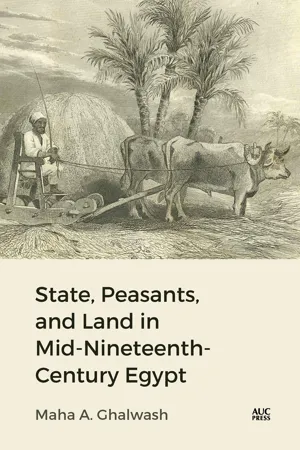
- 352 pages
- English
- ePUB (mobile friendly)
- Available on iOS & Android
State, Peasants, and Land in Mid-Nineteenth-Century Egypt
About this book
An alternative reading of the relationship between the state and smallholder peasants in mid-nineteenth-century Egypt
This book examines the rural history of Egypt during the middle years of the nineteenth century, a period that is often glossed over, or altogether forgotten. Drawing on a wide array of archival sources, some only rarely utilized by other scholars, it argues that state policy targeting the peasant land tenure regime was informed by the dual economic principles of the Ottoman, or traditional, philosophy of statecraft, and that the workings of the relevant regulations did not produce extensive peasant land loss and impoverishment.
Maha Ghalwash presents a rich, detailed analysis of such crucial issues as land legislation, tax impositions, the system of tax collection, modes of land acquisition, large-scale peasant abandonment of land, the emergence of surplus lands, the formation of large, privileged estates, distribution of village land, female land inheritance, and the nature of peasants' political activity. In investigating these issues, she highlights peasant voices, experiences, and agential power.
Traditional interpretations of the rural history of nineteenth-century Egypt generally specify an avaricious state, so indifferent to peasant well-being that it consistently developed harsh policies that led to unremitting, extensive peasant impoverishment. Through an examination of the relationship between the absolutist state and the majority of its subject population, the peasant smallholders, during 1848–63, this study shows that these ideas do not hold for the mid-century period.
State, Peasants, and Land in Mid-Nineteenth-Century Egypt will be of interest to students of Middle East history, especially Egyptian rural history, as well as those of peasant studies, subaltern studies, gender studies, and Ottoman rural history.
Frequently asked questions
- Essential is ideal for learners and professionals who enjoy exploring a wide range of subjects. Access the Essential Library with 800,000+ trusted titles and best-sellers across business, personal growth, and the humanities. Includes unlimited reading time and Standard Read Aloud voice.
- Complete: Perfect for advanced learners and researchers needing full, unrestricted access. Unlock 1.4M+ books across hundreds of subjects, including academic and specialized titles. The Complete Plan also includes advanced features like Premium Read Aloud and Research Assistant.
Please note we cannot support devices running on iOS 13 and Android 7 or earlier. Learn more about using the app.
Information
Table of contents
- Cover
- Title Page
- Copyright
- Dedication
- Contents
- List of Tables
- Abbreviations
- Preface
- Note on Transliteration, Spelling, and Dates
- Introduction
- 1. The Land Laws
- 2. Peasants and Taxes
- 3. System of Tax Collection
- 4. Land Tenure in Peasant Villages
- 5. Peasant Women and Inheritance of Land
- Conclusion
- Appendix A: The Distribution of Land in the Sample Villages: Distribution of Land in Alternative Categories
- Appendix B: The Impact of the Major Tax Codes on the Four Sample Villages
- Appendix C: Egyptian Archival Sources
- Notes
- Select Bibliography
- Index